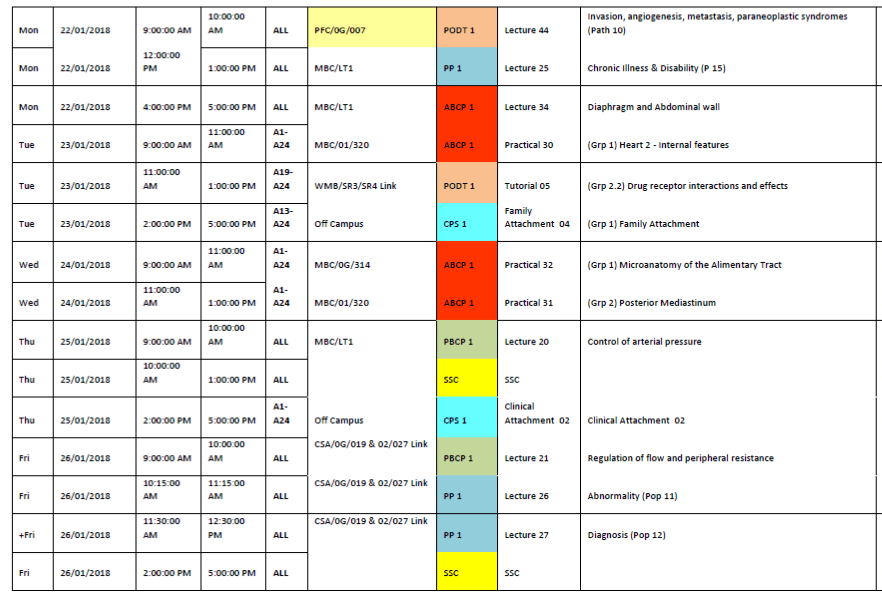Welcome to the 14th week of the Virtual Medicine Open Day: giving you an insight into each of the UK medical schools and the opportunity to ask current medical students about the realities of studying there!
We are now collecting feedback on the Virtual Medicine Open Day. Please fill out this short survey for a chance to win a prize!
This post is written by Rebecca, a 4th year medical student at Queens, Belfast.
I am very excited to be starting my fourth year at QUB. Studying in Northern Ireland is a unique and exciting experience and I’m so glad I choose to come here. QUB is a UK medical school but being the only med school in Northern Ireland it has so much to offer, keep reading to find out why you should consider studying medicine at Queens!
Contents
- An Overview of Teaching Methods
- Typical Timetable of a 1st year Medical Student at QUB
- The Non-Medical Stuff
- Pros
- Cons
- 3 Top Tips For Applying to QUB
- Q&A
An Overview of How We Are Taught
QUB uses an integrated approach to learning but leaning more towards the traditional side of the scale. During the first two years you will spend a lot of time in lectures being taught the theory and core material. This is well linked to clinical application with a lot of case examples within lectures. Lectures are given by academic clinicians and researchers who are great at linking information clinically. To further apply your knowledge, lectures are accompanied by smaller group tutorials which are fully case based. As well as tutorials you will have physiology labs where you learn through practical experiences and test the principles taught in lectures.
Queens is one of the few medical schools which still use full body cadaveric dissection in the first two years. You will spend an afternoon a week in the dissection suite learning anatomy in its most real form. These sessions are taught by trainee or retired surgeons who have great clinical knowledge to impart. The student selected component programme allows you to investigate an area of special interest and take a step away from the core curriculum. In first year, you complete an SSC in the second semester and then two more in second year and again in third year. The module options range from research based to community medicine to more clinical experiences especially come third year.
The most enjoyable sessions for me where the clinical skills teaching which begins in week one of first year in the Clinical education centre (CSEC). CSEC has a mock ward and a vast range of practical models. Teaching in clinical skills is taught early and in small groups which gives you lots of practise and great personal feedback to help shape you into a great doctor. Clinical skills teaching is paired with early clinical placement. First semester of first year features a family attachment project where you visit a person living with a chronic illness and learn from their experiences as well as spending time within their GP practise leaning about chronic illness in primary care. In the second semester and into second year this clinical experience grows as you spend an afternoon a week attached to a GP practise or on a hospital ward developing your clinical skills.
All this practical learning sets you up well for full time clinical placements from 3rd year onwards. Third year includes two large block in general medicine and general surgery before rotating around smaller specialties during the other half of the year. Forth year takes the shape of 6 week block placements in larger specialities such as emergency medicine, general practise and obstetrics & gynaecology. Final year then recaps general medicine, surgery and GP in preparation for finals before then undertaking an assistantship to prepare for starting as an F1 doctor in a few months.
Teaching occurs in a range of group sizes depending on the learning. Lectures are a whole year experience (250+) which may seem daunting, but the year is then split in half as A or B. Then further subdivided into small groups of 6 students. You will get to know your 5 group member super well, in dissection it may be the 6 of you but in tutorials a few groups may join together. This small group learning is a great way to get to know people on the course and facilitates very practical, hands on learning.
A Typical Timetable of a 1st Year Medic

ABCP – Anatomical Basis of Clinical practise (anatomy and dissection classes)
PP – Peoples and Populations
CPS – Clinical and Professional skills
PBCP – Physiological basis of clinical skills
PODT – Principles of disease and treatment
SSC – Student Selected Components
The Non-Medical Stuff
QUB medical school is located in Belfast the bustling capital city of Northern Ireland. Belfast has a great culture and is a welcoming city! The medical campus is located beside the City hospital and is just a few minutes walk from the main red brick university. The main student accommodation is located at Elms Village a 15 minute walk from campus and is a great place to live and to socialise. The university has a vast range of clubs and societies both medical and nonmedical so you wont be short on something to do. If sports are more you thing we have plenty of teams and opportunities to try something new! The university and accommodation are all located in the Queens Quarter which is known for its great food as well as museums and art galleries. Botanic avenue is a favourite spot for students from top notch coffee at Town Square to a life changing burrito at boojum.
For many people choosing QUB, means moving country. Northern Ireland has so much to offer from stunning scenery and the film locations of Game of thrones to great nightlife and amazing food. NI is a small country and so you are never far from a beach, forest or mountain depending on what takes your fancy. The Northern Irish history and stunning scenery can provide many a day trip from visiting the giants causeway or going to Derry/Londonderry to see the walls and get the ‘Derry Girls’ TV show experience.
Pros of Studying at QUB
• Cadaveric Dissection – Cadaveric teaching is a privilege. Not many medical school can offer this form of teaching but queens have a state of the art dissection suite which is a fantastic learning environment. Seeing the anatomy up close with all its relations makes a much clearer picture than any textbook could offer. As these sessions are taught by surgeons the clinical applications makes the learning process more engaging.
• Excellent Clinical teaching – Queens is known for its high level of clinical teaching across a wide range of hospitals. Northern Ireland is classed as one medical deanery and so as a QUB medical student you will get to experience a range of hospitals from large trauma centres to rural community hospitals. Having such a range of hospitals and primary care settings teaching can occur in small groups and allows a more involved and hands on approach of clinical learning.
• Northern Ireland – This little country is so packed with history and culture to experience during your time here. NI is well known for its warm welcoming and making you feel at home. Our funny accents and odd little sayings will soon become part of your life. Belfast is also one of the cheapest student cities to live in and a bit of extra cash to spend on those student deals is always a plus!
• Medical Societies – QUB has a huge range of medical based societies covering just about every medical specialty hosting talks by doctors in the field and training events. Scrubs is the surgical society which runs suturing courses and revision sessions before exams and my favourite event of the year being the emergency medicine conference. There are also outreach societies such as teddy bear hospital, SWOT and Belfast marrow. Plus the awesome BMSA to bring you the best medical nights out including the mystery bus tour and year group formals.
Cons of Studying at QUB
• Weekends – Northern Irish students have an odd tradition to retreat back home every weekend. This can leave non-NI students alone at the weekends. Thankfully with a large population of mainland UK students who all remain in Belfast at the weekends. Medicine is particularly aware of this weekend slump and students have set up the medic for medics society to organise weekend events and trips for those remaining in Belfast. Additionally, the hospitality of NI students mean that you will likely end up with an invite to head home for a Sunday roast with your friends.
• Contact time – The contact time in the pre-clinical phase is hefty. With so many lectures, labs, tutorials and clinical sessions the timetable can be quite a bit busier compared with other med schools who use a more self directed form of teaching such as PBL. For me, I found the increased contact time helpful and I kept me focused and accountable to my learning, but for others they learn better on their own time.
3 Top Tips For Applying to QUB
1. Dedication to Queens – Part of the queens entry requirements to queens is a dedication to wanting to go here. This means if you are applying for a second time (a year out or as a graduate applicant) they want you to have applied during your first application round and may not consider your application otherwise.
2. Interview Prep is key – besides the academic requirements the major hurdle is the interview. QUB use the interview to rank candidates for offers. Developing your skills of role play and MMI technique will really help you prepare for the interview process.
Know your work experience – although the personal statement does not form a large part of the application for QUB, it is still important to know not only what experience you have but what you have learned from it for your interview. Its more important to show how these moments have shaped you into a better applicant than have big flashy experiences.
Thank you Rebecca for providing such a detailed and interesting insight into Queen’s. You can follow her on instagram to find out more about QUB:
Your Turn To Ask Any Questions!
Thank you for submitting your questions, they’ve now been answered by a current student – click below to read the answers!
Make sure you subscribe to this website to have the overview for the rest of the medical schools delivered straight to your inbox!


Where do most medics tend to live in terms of accommodation? Can BT9 get very distracting?
LikeLike